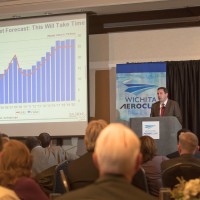News
Aviation Analyst Aboulafia Delivers a Dose of Optimism for Wichita
April 13, 2011 8:00am

Wichita, Kan. (April 13, 2011) – Aviation analyst Richard Aboulafia was the inaugural speaker when the Wichita Aero Club formed in late 2008. At that time, the industry decline was just beginning.
More than two turbulent years later, Aboulafia made a repeat appearance at the organization’s monthly luncheon on Tuesday, April 12 and this time his presentation had a different angle.
“In good times, an analyst is a cheerleader,” said Aboulafia, a vice president of analysis with Virginia-based The Teal Group. “In bad times, he’s a therapist.”
In a presentation titled “Okay the sky has fallen, it will rise again,” Aboulafia delivered a dose of optimism for Wichita. Among many feel-good messages, he told the audience, “This industry is coming back, and Wichita will too.”
Aboulafia said The Teal Group forecasts general aviation production to begin to rebound in 2012, and called the firm’s prediction of 10 percent compounded annual growth rate for the next six years conservative.
He also shared his analysis of the jetliner/regional, defense and rotorcraft markets, but he spent most of his time talking about the business jet market, specifically Wichita’s role.
Aboulafia revisited thoughts he’d shared with the WAC in late 2008.
Richard Aboulafia’s five Wichita-related thoughts (revisited and revised)
1. There are five great aviation clusters in the world today. Wichita is one of them. Clusters cannot be created; only destroyed. (Still true.)
2. Of these clusters, Wichita has the highest exposure to the business jet market, the fastest growth segment, but with very high cyclicality. (What nobody saw coming was the bifurcation between the top and bottom half. I also thought the business aircraft peak would come in 2009, just after my speech; turned out it was in 2008. I’d also point out that Wichita has the most diverse industrial base of any cluster.)
3. Business jets are well behind the other aviation segments in outsourcing, a possible threat to manufacturing jobs in Wichita. While it’s also an opportunity (with Spirit), there’s no guarantee that work will be performed here. (Still true.)
4. I’m skeptical about KC-X. But the military overhaul/upgrade market is growing. (Very wrong on the first, right on the second.)
5. São Jose Dos Campos wants some of your business. (Still true.)
Of the five clusters – Wichita; Montreal; Dallas; the Puget Sound area in Washington; and Toulouse, France – Aboulafia said, “Wichita was the epicenter of all pain. Really, the only cluster that wasn’t sheltered on the whole globe was Wichita.”
However, he added, Wichita “is not going to be a destroyed aviation cluster.”
The reason Wichita felt so much pain, he said, was a one-two punch of bifurcation and emerging competition.
While the upper half of the market – aircraft priced at $25 million and higher – held up during the downturn, he explained, the bottom half of the business jet market saw an unexpected 57 percent drop from 2008-2010. Wichita is most connected to that bottom segment.
“This was a profound change on how the industry was structured,” he said, adding that nobody could have predicted that kind of split.
The impact of that split was compounded, Aboulafia said, because it coincided with Embraer bringing to market a less expensive product. He noted that this was the business jet market’s first new competitor since 1969.
“This only happens once,” he said. “There are no other Embraers and the entry barriers to the market are still quite high.” Aboulafia also said Embraer seems to be turning its attention away from developing more new business jet models to other areas of its business.
Aboulafia’s dose of optimism was tempered with an analysis of key market indicators – aircraft utilization is on the rise; pre-owned business jet inventory is lowering but is still too high; it’ll be another six months before pricing rebounds; corporate profits are recovering nicely but there’s still a general sense of uncertainty in the economy.
“You are seeing a lot of signs of growth that point toward an increase in production in 2012. We don’t know how much growth, but we can look at the past upturns and typically they’ve been double-digit,” he said. “So there’s a lot of hope moving forward.”
The Wichita Aero Club’s next luncheon features Congressman Mike Pompeo, United States House of Representatives fourth district of Kansas, on May 9th at the Wichita Airport Hilton. The luncheon will begin at noon. Tickets are $40 for non-members and $30 for members of the Wichita Aero Club. More information is available at wichitaaeroclub.org or by calling 316-641-5962.
To view photos from this event click here WAC Photo Gallery
